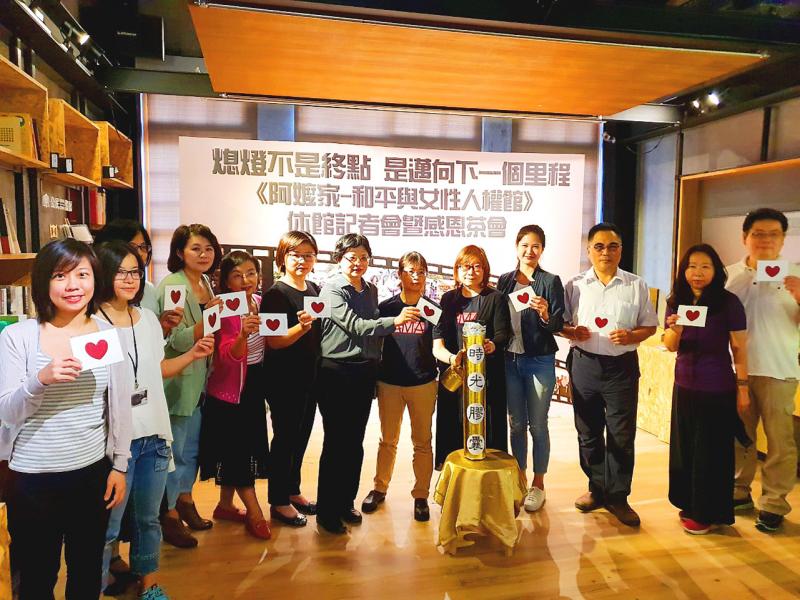The Ama Museum, which is dedicated to Taiwanese women who were pressed into sexual slavery during World War II, is to close it doors on Tuesday next week due to unsustainable operational losses, but it plans to reopen in a new location in April next year, the Taipei Women’s Rescue Foundation said yesterday.
The museum, located in a nearly 200-year-old two-story building in Taipei’s historic Dadaocheng (大稻埕) area, was established in 2016 and is dedicated to preserving and commemorating the history of Taiwanese “comfort women” and highlighting women’s rights.
More than 2,000 Taiwanese women are estimated to have been forced into sexual slavery in areas occupied by the Imperial Japanese Army during the war, the museum said.

Photo provided by Taipei Women’s Rescue Foundation
Ama is an honorific term that many Taiwanese use to address their grandmothers and is also used to address older women in general.
The museum documents the stories of 59 Taiwanese amas — survivors of the comfort women system who after the war came forward to give testimony.
Foundation chief executive officer Tu Ying-chiu (杜瑛秋) said that the museum posted a loss of more than NT$4.07 million (US$140,947) last year, and more than NT$2.67 million in the first nine months of this year.
“The museum had cut expenses — from a monthly average of about NT$950,000 last year to about NT$600,000 this year, but then the number of visitors significantly dropped due to the COVID-19 pandemic,” she said.
Tu said that the museum had 9,065 visitors last year, but only 1,414 visitors from January to June this year, and the numbers only went up after the foundation in July announced to close the museum.
After initial difficulties finding a new location, the foundation last week signed a rental contract for a 60 ping (198m2) unit in an office building on Chengde Road, she said.
The foundation last month launched a crowdfunding campaign with a goal of raising NT$3 million to relocate the museum, but has since reduced the target to NT$2 million, Tu said.
“The women’s stories are part of the nation’s history, so we must pass them down,” foundation president Theresa Yeh (葉德蘭) said.
Tu said that the museum plans to publish a book next year to showcase the stories through conversations between a granddaughter and her ama, to spark readers to reflect on discrimination.
The book would target young readers, from third-grade elementary-school students upward, Tu added.
Upon reopening, the museum would also introduce new thematic exhibitions, she said.
The museum hopes to further reach out to junior and senior-high schools to share the stories of the amas and discuss human rights issues, she added.

Taiwan has received more than US$70 million in royalties as of the end of last year from developing the F-16V jet as countries worldwide purchase or upgrade to this popular model, government and military officials said on Saturday. Taiwan funded the development of the F-16V jet and ended up the sole investor as other countries withdrew from the program. Now the F-16V is increasingly popular and countries must pay Taiwan a percentage in royalties when they purchase new F-16V aircraft or upgrade older F-16 models. The next five years are expected to be the peak for these royalties, with Taiwan potentially earning

STAY IN YOUR LANE: As the US and Israel attack Iran, the ministry has warned China not to overstep by including Taiwanese citizens in its evacuation orders The Ministry of Foreign Affairs (MOFA) yesterday rebuked a statement by China’s embassy in Israel that it would evacuate Taiwanese holders of Chinese travel documents from Israel amid the latter’s escalating conflict with Iran. Tensions have risen across the Middle East in the wake of US and Israeli airstrikes on Iran beginning Saturday. China subsequently issued an evacuation notice for its citizens. In a news release, the Chinese embassy in Israel said holders of “Taiwan compatriot permits (台胞證)” issued to Taiwanese nationals by Chinese authorities for travel to China — could register for evacuation to Egypt. In Taipei, the ministry yesterday said Taiwan

Taiwan is awaiting official notification from the US regarding the status of the Agreement on Reciprocal Trade (ART) after the US Supreme Court ruled US President Donald Trump's global tariffs unconstitutional. Speaking to reporters before a legislative hearing today, Premier Cho Jung-tai (卓榮泰) said that Taiwan's negotiation team remains focused on ensuring that the bilateral trade deal remains intact despite the legal challenge to Trump's tariff policy. "The US has pledged to notify its trade partners once the subsequent administrative and legal processes are finalized, and that certainly includes Taiwan," Cho said when asked about opposition parties’ doubts that the ART was

If China chose to invade Taiwan tomorrow, it would only have to sever three undersea fiber-optic cable clusters to cause a data blackout, Jason Hsu (許毓仁), a senior fellow at the Hudson Institute and former Chinese Nationalist Party (KMT) legislator, told a US security panel yesterday. In a Taiwan contingency, cable disruption would be one of the earliest preinvasion actions and the signal that escalation had begun, he said, adding that Taiwan’s current cable repair capabilities are insufficient. The US-China Economic and Security Review Commission (USCC) yesterday held a hearing on US-China Competition Under the Sea, with Hsu speaking on